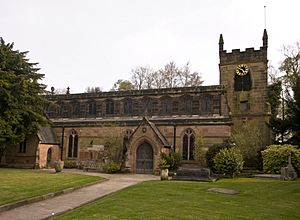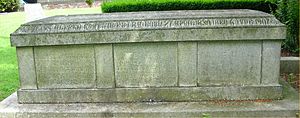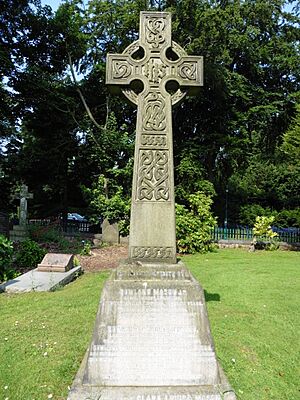St Bartholomew's Church, Edgbaston facts for kids
Quick facts for kids St Bartholomew's Church, Edgbaston |
|
|---|---|
 |
|
| 52°27′39″N 1°55′02″W / 52.4607°N 1.9171°W | |
| Denomination | Church of England |
| Churchmanship | Central churchmanship/Conservative Evangelical |
| Website | [1] |
| History | |
| Dedication | St Bartholomew |
| Administration | |
| Parish | Edgbaston |
| Deanery | Edgbaston and Warley |
| Diocese | Birmingham |
| Province | Canterbury |
St Bartholomew's Church in Edgbaston is a special old church in Birmingham, England. People also call it Edgbaston Old Church. It's part of the Church of England.
Contents
A Look Back at the Church's History
St Bartholomew's Church is very old, dating back to the Middle Ages. Most of the church was rebuilt in the 1800s. The architect J. A. Chatwin added parts like the chancel and chapels in 1885. He is buried in the churchyard. His grave, and a few others, are considered important historical monuments.
Special Memorials Inside the Church
You can find a memorial inside the church for a doctor and plant expert named William Withering. He was famous for using a plant called foxglove to make medicine. The memorial has carvings of foxgloves and another plant named after him, Witheringia solanaceae.
The Church Bells
The church tower holds eight large bells. The heaviest bell weighs about 10 and a half long tons. The oldest four bells were made in 1685. Students from the Birmingham University Society of Change Ringers ring these bells during term time.
The Church Organ
The church has a beautiful organ that has been updated over the years. Lord Calthorp gave a small organ to the church in 1837. A larger organ was built in 1857. The current organ was rebuilt in 1956.
In 2012, the organ was badly damaged by rain after lead was stolen from the church roof. The church raised £70,000 to fix it. The organ was rebuilt and moved to a new spot in the church. You can find more details about the organ on the National Pipe Organ Register.
People Who Played the Organ
Many talented musicians have been organists at St Bartholomew's Church. Here are some of them:
- John Augustus Sherman
- John Robert Lunn (1846–1847)
- Stephen Samuel Stratton (1867–1875)
- Samuel Bath (until 1877)
- Herbert Walter Wareing (1881–1888)
- Theodore Stephen Tearne (1888–1903)
- Henry Taylor (1903–around 1927)
- Russell Harry Coleman Green (1933–1958)
- Anthony John Cooke (1958–1964)
- A John Flower (1964–1967)
- Michael Jones (1967–1989)
- Bryan Brown (1989–1996)
- Graeme Martin (1996–1997)
- Roland Keen (1997–2007)
- Father Clifton Graham (2007–2010)
- David Griffiths (2010–2024)
The position is currently vacant.
Burials in the Churchyard
Many notable people are buried in the churchyard of St Bartholomew's.
- John Thackray Bunce, who was an editor for the Birmingham Daily Post newspaper.
- J. A. Chatwin, the architect who helped rebuild parts of the church.
- William Haywood, an architect and city planner. He was also the first Secretary of The Birmingham Civic Society.
- John Pixell, a poet, priest, and composer.
- Joseph Henry Shorthouse, an author known for his book "John Inglesant".
There is also a war grave for Lieutenant Rowland Charles Mason. He was an officer from the Loyal Regiment who died during World War I.
 | Georgia Louise Harris Brown |
 | Julian Abele |
 | Norma Merrick Sklarek |
 | William Sidney Pittman |



